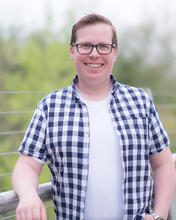 In the world of climate change, sustainability and environmental work, co-op students use math to help develop solutions for the future.
In the world of climate change, sustainability and environmental work, co-op students use math to help develop solutions for the future.
“We are in a bit of a climate emergency,” says Mike Bloxam (BMath’ 06), founder and chief sustainability officer at SunTap Technologies. “The more people getting involved with renewable energy and general sustainability is great. We need all different academic backgrounds working on solutions.”
Bloxam started his environmental journey as a co-op student with a solar thermal equipment manufacturer. Following two co-op work terms with the company, he started working with them full-time. He felt he was using his computer science background to make a difference. “I’ve always had interest in environmental technology and renewable energy. My co-op job was an interesting mix of programming to help a renewable energy company,” he says.
Through this role with the thermal equipment manufacturer, Bloxam created wireless handheld devices to control pumps and energy monitoring and other things. Years later, he founded his own company, SunTap Technologies, which installs solar equipment for residential and commercial use.
“Co-op definitely guided me towards landing a job in renewable energy. Twelve years later I’m still involved in solar energy and still loving it,” he adds. Bloxam also still loves co-op. He’s hired students to work on automations, research and installations for his company.
Emerging environmental talent
Environmental issues affect individuals and communities around the world. Organizations are relying on emerging talent to analyze the effects and to help find solutions. Through a math lens, this includes applying concepts of graphing, data collection, mathematical modelling and numerical calculations. Mathematics provides confidence in climate change models and can help to improve existing renewable technologies.
Another organization in the industry that utilizes co-op students is Environment and Climate Change Canada. A branch of the Government of Canada, they have hired math students for roles such as machine learning programmer, student database developer and water resource technician.
 Lily Cao is a Waterloo co-op student who is making an impact as a junior environmental research scientist.
Lily Cao is a Waterloo co-op student who is making an impact as a junior environmental research scientist.
“I have been interested in the sciences for a long time, so when I saw the position, I was extremely excited about the prospect of combining both these fields,” she says. “The project involves working with instruments and studying their effectiveness through machine learning, which aligns with my interest in learning about how software programming is being applied to a wide range of fields today.”
Tackling data for climate predictions
Cao has developed a new appreciation for how integral data is to weather and environment predictions. She is currently working on understanding the effectiveness of using lidar profiles to predict precipitation. This work involves extensive data testing to gather results.
“As a computer science student, I don’t get to learn about weather and the atmosphere in depth. This project has given me the opportunity to become familiar with some of the concepts and how it’s applied to real-world usage,” she says. “I’ve learned a lot about how the atmosphere works and the kinds of data we use to measure changes and create predictions.”
Various instruments need different methods of extraction and processing, which all need to come to a standardized format before any testing can begin. “To continue learning about the environment and its changes, new models are developed and improved on. So, I see math skills as being important in the future of research on climate change and the environment,” she adds.
Bloxam similarly sees the need for math in the environmental world, especially when it comes to technology. The wider renewable energy field is becoming more reliant on automation. “This certainly requires a good knowledge of programming basics and computer science theory. The University of Waterloo has exceptional co-op students and I’m sure that many are willing to take on this work,” he says.
Looking to make a social impact? Co-op students can help your organization move environment and sustainable projects forward.






